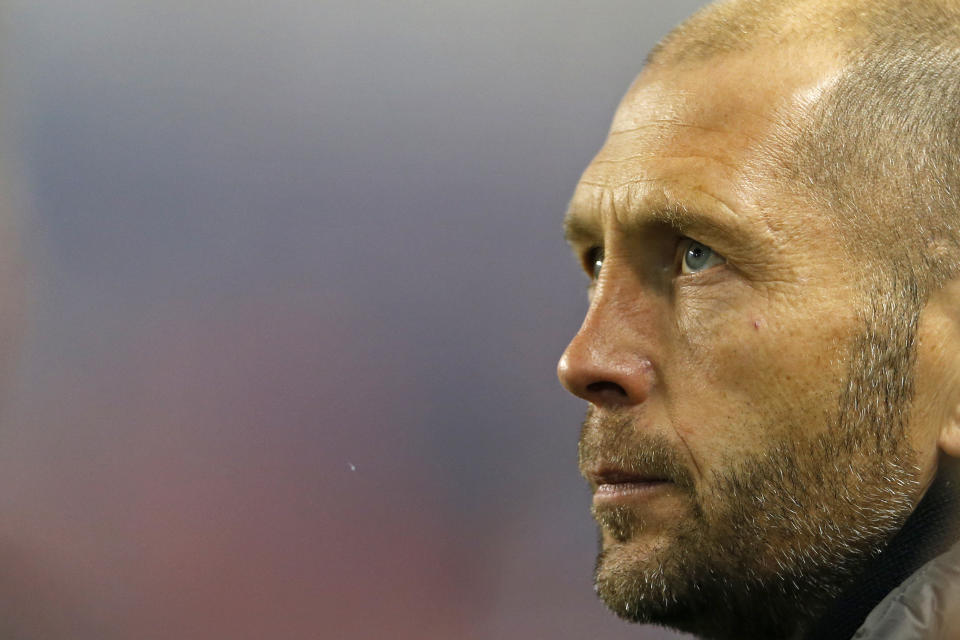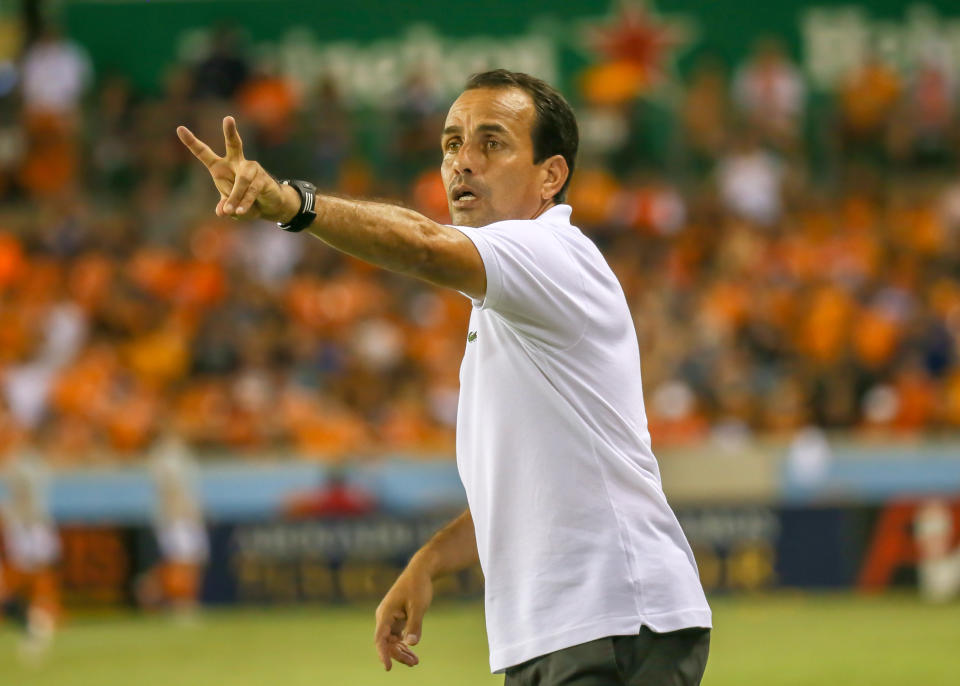McIntyre's 23 Thoughts: Oscar Pareja interviewed for USMNT job; Berhalter close to deal

Doug McIntyre’s weekly MLS column, 23 Thoughts, parses through the latest insights and inside info from around American soccer.
For months now we’ve wondered who else U.S. Soccer has seriously considered, besides Columbus Crew boss Gregg Berhalter, for its vacant head coaching position. The list of those who haven’t been is long: Dave Sarachan, Tab Ramos, Tata Martino, Peter Vermes, Bob Bradley, Juan Carlos Osorio. Now we know at least one more name that has: former FC Dallas manager Oscar Pareja did formally interview for the job, multiple sources told Yahoo Sports.
My understanding is that Berhalter and the USSF are currently finalizing an agreement. No deal had been signed as of Wednesday, but if things go to plan the hiring would be announced late next week, a source with knowledge of the situation said. The former USMNT defender would then be formally introduced during a press conference in New York City during the first few days of December.
If the two sides fail to reach an agreement, though, U.S. Soccer would be in a tough spot. Pareja, who resigned Tuesday as FCD’s coach after five seasons, has already agreed to join Liga MX side Club Tijuana, according to Goal.com’s Ives Galarcep. Berhalter and Pareja are the only people U.S. men’s national team GM Earnie Stewart has formally interviewed for the position, sources said.
1. Berhalter, who has coached the Crew for the last five years, is believed to have significant leverage in his negotiations with the federation. He’s drawn interest from the LA Galaxy, where he won an MLS as a player/coach in 2011. It’s also possible that he could sign an extension in Columbus or even with current Crew owner Precourt Sports Ventures, which is expected to relinquish control of the club as part of an arrangement that would allow them to field an expansion team in Austin, Texas.
2. I’m hearing that Berhalter and Pareja were among four finalists identified by Stewart. I don’t know the identity of the others, at least not yet, but am told that the list included at least one international candidate from outside MLS.

3. Pareja, a former midfielder with Colombia’s national team, was telling the truth when he said in late September that he hadn’t interviewed for the U.S. job. No meeting with Stewart had taken place at that point, although the federation had made its interest known. The interview happened after that.
4. With Pareja headed elsewhere, what will Stewart and the U.S. do if Berhalter ultimately decides not to sign? I have no idea. I don’t think the USSF does, either, although Pareja reportedly has a clause in his contract that would allow him to leave Tijuana if the USMNT position becomes available.
5. Pareja’s resignation means there are now three plum job openings in MLS in Dallas, Atlanta, and LA, with Columbus likely to join them in short order. The Vancouver Whitecaps (Marc dos Santos) and San Jose Earthquakes (Matias Almeyda) have already filled their seats for 2019, while the New York Red Bulls and New York City FC changed coaches midseason. Not sure any other MLS season produced that level of turnover. It certainly keeps things interesting.
6. With the USMNT being badly outplayed in its recent friendlies against England and Italy, the year-plus it’s taken to hire a new coach has again been put under a spotlight. It’s worth pointing out how unusual it is for the national team to be this active at the end of a World Cup year. The Americans played six matches over the last half of 2018, up from five in 2014, four in 2010, and zero in 2006. Bob Bradley was named interim U.S. coach on Dec. 8, 2006. Bradley’s interim tag wasn’t removed until the following May, or at almost the exact same point of the current cycle. (The 2022 World Cup will be played in November-December instead of the usual June-July.)
7. My guess is that U.S. Soccer will go to great lengths to show how chief commercial officer Jay Berhalter recused himself from any and all meetings and discussions regarding the hiring of the head coach. They have to. Something I think they’ll have a harder time explaining is why Jay Berhalter was involved in the decision to hire Stewart.
8. For the record, I don’t believe any conspiracy theory that the elder Berhalter engineered the hiring of his brother from the start. As a former World Cup participant for the U.S. who played and coached in on both sides of the Atlantic, Gregg Berhalter was always an obvious candidate.
9. Precisely because that was the case, the USSF should’ve seen the potential appearance of a conflict of interest a mile away. They didn’t. This was totally avoidable. It’s not like Stewart, always an obvious GM candidate, wouldn’t have been hired if Jay Berhalter recused himself from the GM search, too. Unfortunately, it means some will be skeptical of Gregg Berhalter’s hiring, if it happens, through no fault of his own.
10. Feedback on the last version of 23 Thoughts was swift. Within hours of the column posting, I was told that the MLS brass recognized that the current playoff format was problematic, and that the league was hoping to have a new plan in place for next year and beyond ready in time for commissioner Don Garber to announce the changes during his annual pre-MLS Cup State of the League address.
11. Miki Turner of The Athletic did a terrific job reporting out the details: Single elimination playoffs, which would finally reward the better regular season teams by giving them home-field advantage throughout the postseason, with MLS Cup played before the November international break.
12. The regular season slate would be completed about three weeks earlier, with the playoffs kicking off after October’s international fixture window. With three more teams — Cincinnati, Nashville and Miami — set to join the circuit in the next couple of years, how is MLS going to squeeze all those extra games into a more condensed calendar? Simple: by playing a lot more midweek games.
13. Personally, I think that’s long overdue. MLS resisted playing midweek or years, mainly because those games are harder to sell tickets. This has become less of an issue as the league has matured, especially in the stronger markets. Regular midweek matches also provide an opportunity to grow the fanbase on television; for the most part there’s no NFL, NBA, NHL or college sports to compete during the summer months.

14. Moving MLS Cup up makes total sense. It was cold, really cold, during the last two finals in Toronto, but the games got played. The league got lucky; snowstorms in Canada aren’t exactly rare in December. The same can be said for places like Chicago, New England, Minnesota, New York and even Kansas City, which hosted the coldest MLS Cup on record in back 2013.
15. I’ve been thinking a lot about a conversation I had with a Western Conference general manager on the eve of the 2016 finale. According to this GM, part of the reason MLS extended its season into December to begin with — it’s easy to forget that six of the first seven MLS Cups were played in October — was to appease former U.S. coach Jurgen Klinsmann.
16. Klinsmann constantly complained, publicly and privately to league suits, that the offseason for USMNT players in MLS was too long compared to their European-based teammates. From 2003-11, the MLS champ was crowned before Thanksgiving. Starting in 2012, Klinsmann’s first full year with the U.S., MLS Cup was moved to December. Coincidence?
17. There’s no perfect playoff format. The current system certainly has its flaws, but also advantages. Let’s pretend for a second that the league had adopted single-elimination this year. A one-and-done Eastern Conference final between the New York Red Bulls and Atlanta United would be hosted by the Supporters Shield winners at 25,000-seat Red Bull Arena. How many millions would that have cost Atlanta owner Arthur Blank, whose team will probably come close to filling 70,000-capacity Mercedes-Benz stadium for Sunday’s opening leg?
18. Out west, the No. 5 seed Portland Timbers are two games away from MLS Cup. Under single elimination, the Timbers could potentially hoist the trophy without playing one postseason match in front of their raucous fans at Providence Park. That’s not ideal. From a television perspective, playing MLS Cup on a Saturday night in early December is good, since there’s no college football to contend with. That won’t be the case in November.
19. As good as Atlanta was for most of year, they seemed headed for an early playoff exit following a late-season swoon. First, the club confirmed reports that coach Tata Martino wouldn’t return for 2019. Days later, United got routed 4-1 at already-eliminated Toronto FC, surrendering the Supporters Shield to the Red Bulls in the process. Momentum was not on their side. Then Atlanta produced a near-perfect road performance on NYCFC’s matchbox-sized field before dispatching the Pigeons at home in a 4-1 aggregate win. I was curious how they turned things around.

20. “We had a chat among ourselves,” goalkeeper Brad Guzan told me last week in London before the U.S.-England match. “We know we’re a good team football-wise, but we agreed that we needed to show some fight and competitiveness and desire to win. We set the tone early in that first leg in terms of challenging for second balls, which was something we were missing in that Toronto game.”
21. When Atlanta and the Red Bulls last met, on Sept. 30, New York walked away with a 2-0 win despite playing without perhaps its top two players in Tyler Adams and Bradley Wright-Phillips. United is looking for revenge. “We were nowhere near best in that game,” Guzan said. “With the first game in Atlanta, it’s important that we get off to a good start.”
22. It’s hard to overstate how good a job Tab Ramos has done with the U.S. U-20s, who won their second consecutive CONCACAF title on Wednesday with a dominant 2-0 win over rival Mexico. I’m hearing rumblings that Ramos is on Dallas’s radar as a replacement for Pareja, and he should be. He’s a perfect fit. The question is, would Ramos leave the U.S. before the U-20 Cup begins in May? Would he have to?
23. Six MLS academy products were named to the CONCACAF tourney’s Best XI, including Ayo Akinola (Toronto FC), Chris Gloster (Red Bulls), Mark McKenzie (Philadelphia Union), and Brandon Servania (FC Dallas). That’s a feather in the league’s cap. It’s also a bit bittersweet, though, as the best two U.S. players, Ulysses Llanez and Alex Mendez, have already left the LA Galaxy academy. Both Llanez and Mendez will begin their professional careers in Germany after declining to sign with LA.
Doug McIntyre covers soccer for Yahoo Sports. Follow him on Twitter @ByDougMcIntyre.
More soccer on Yahoo Sports:
• 23 for ’22: With Qatar four years away, how could USMNT roster look?
• Takeaways form the USMNT’s year-ending 1-0 loss to Italy
• Uncertainty catches up to Americans in embarrassing loss to England
• England reserves rout U.S. at Wembley in Wayne Rooney’s send-off


